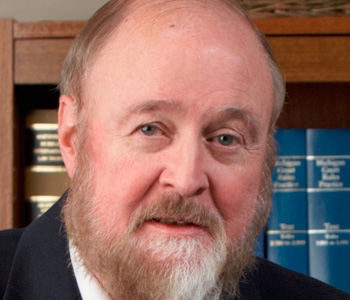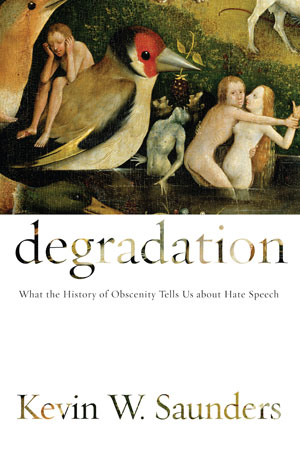
This book attempts to place hate speech into a context of long lineage.
While hate speech has almost undoubtedly been around for as long as people have been able to recognize differences between their groups and others, the recognition that there is an impropriety in the speech is of far more recent vintage.
But there is another variety of expression that has long been regulated: obscenity. I do not argue that hate speech is obscene—but that the concerns that lead a society to place certain sexual material in that category are similar to the concerns raised by hate speech.
While obscenity has focused on sex, the concern has been less about sex and more about degradation.
Cultures that have allowed rather explicit pornography do not view sex as degrading. It is in cultures that do see sex as degrading that pornography comes to be considered obscene—and subject to restriction.
While there are certainly subject matter distinctions between classical obscenity and hate speech, they may be seen as similar—in that both may be viewed as degrading.
If there are to be restrictions on hate speech, as exist in many countries and in some situations even in the United States, the relationship between obscenity and hate speech may provide a basis for identifying racist, sexist or homophobic speech. The path of the law in defining obscenity may provide guidance in identifying expressions of hate.
“A monotheistic God is not a sexual creature. Depictions of human sexuality show how far we are from the divine and emphasize our animal nature. This could explain the relative similarity in this area in Christian, Judaic and Islamic cultures.”
My interest in the concept of obscenity grew out of a law school course on the topic of the rhetoric, law and culture. One of the readings was Sophocles’ play Philoctetes, and the professor noted that the play’s violence occurred offstage. It was ab scaena or obscene.
That led to an interest in understanding why the concept had shifted from violence to sex. It also led to my first book, in which I argued that depictions of violence could still be considered obscene, not only conceptually, but also legally.
A continuing interest in the concept later led me to consider why it was that cultures such as the Greeks of the classical era were very accepting of sexual depiction, while others saw the need to restrict such material. I concluded that sexual depiction was tolerated by the Greeks because they did not see it as degrading. This raised the question of why the Greeks had such a different attitude from that which prevailed in later Europe.
The major distinction that I found between cultures that tolerated and even openly appreciated depictions of sex and those that found them somehow shameful was in their views of the nature of the divine.
The Greek gods and goddesses were themselves highly sexual creatures. The depiction of humans as sexually engaged did not distinguish them from the gods and place them on the animal side of some divine/animal chasm. These depictions were simply not degrading.
Outside of Europe, on the polytheistic side, this distinction explains the sexual nature of carvings in Hindu temples and in Indian literature in the precolonial era. It also explains the Shinto culture of Japan. It might also explain differences with regard to sexuality in Scandinavia and the rest of Europe, given the longer ascendancy and shorter period of dormancy of the Nordic gods.
With the onset of a monotheistic religion, the situation changed. A monotheistic God is not a sexual creature. Depictions of human sexuality show how far we are from the divine and emphasize our animal nature. This could explain the relative similarity in this area in Christian, Judaic and Islamic cultures.
In Christian Europe, this led to early limitations on sexual depictions involving the clergy, since they had to be closer to God, and only later to depictions of the ordinary man.
These later restrictions and the great growth in obscenity statutes in the United Kingdom and the United States occurred in an era in which the development of the theory of evolution most strongly called into question humankind’s status relative to the divine and the animal and might be seen as a reaction to that theory.
Today, most people are relatively accepting of our animal nature. And that is accompanied by greater acceptance of sexual depiction. This may explain, on the mild side, the banter of television sitcoms. On the other end, obscenity prosecutions are relatively rare.
While some sexual depictions may degrade by ignoring the humanity of its subjects, sexual depiction is no longer automatically degrading. Sexual depiction does not alter the status of all of humanity, and it does not place us at a level lower than that which we have come to accept.
While hate speech differs from what has been considered obscene, the two are conceptually akin. Hate speech degrades. Rather than degrading all of humanity to a level lower than the divine, it selects a target and degrades that target to a level lower than the rest of humanity.
And this less than universally shared degradation should be of far more concern than any remaining obscenity-based degradation in which we all share.
Given the conceptual similarity between obscene depictions and hate speech, it would seem likely that some guidance could be drawn from the analysis of obscenity that would help us more clearly understand hate speech.
The legal definition of obscenity, at least in the United States, requires that the material appeal to the prurient interest. The prurient interest goes beyond the normal interest in sex to the level of the shameful or morbid. I argued, in my first book, that the distinction is between sex as a part of human relationships and sex divorced from humanity. Where there is this dehumanized emphasis, material can be considered obscene.
Degradation below the level of humanity, then, would seem key in the legal definition of obscenity. That part of the definition can be adapted with ease to hate speech, by requiring an intent to appeal to a degraded or dehumanized view of its target.
It can help to distinguish between the self-labeling and other-labeling uses of the same word. A word may not be objectionable, when used by a member of the group to which it refers. This is because it is unlikely to be used with any dehumanizing intent. When used by someone who is not a member of the group, the assumption of lack of intent is lacking.
But, requiring that we actually find such intent puts us on notice that we must consider the possibility that the intent is in fact lacking. This would help us distinguish between racist utterances and nonracist, although likely unwise, uses of the same word.
The other aspects of the test for obscenity, an offensiveness under community standards and the lack of serious value, could also carry over to utterances of what could potentially be seen as hate speech. While the conclusions on all these issues are likely to be very fact specific, they provide a framework for analyzing expression to determine whether it is nonoffensive or racist, sexist, or homophobic.
“While hate speech differs from what has been considered obscene, the two are conceptually akin. Hate speech degrades. Rather than degrading all of humanity to a level lower than the divine, it selects a target and degrades that target to a level lower than the rest of humanity.”
During the campaign that led to his presidency, Barack Obama called for a national conversation about race, a call later repeated by the Attorney General Eric Holder.
If we are going to engage in that conversation, we must first have some understanding as to the proper vocabulary.
Too often, people refuse to be drawn into any conversation regarding race—out of fear that someone may take their comments as racist. For most of us, that is one of the worst accusations we could face. So we choose to remain silent.
The possibility of this accusation and its resulting stifling of any conversation stems from the fact that identification of speech as racist, sexist, or homophobic seems to occur at the gut level.
Admittedly, in many instances, the gut feeling will be correct. But, there are clearly instances in which what is perceived as hate speech was really not intended as such.
My hope is that this book’s examination of degradation will help us improve our conversation.


Kevin W. Saunders holds the Charles Clarke Chair in Constitutional Law at Michigan State University. Besides Degradation, featured in his Rorotoko interview, he is the author of Violence as Obscenity, Saving Our Children from the First Amendment, as well as dozens of law review articles on issues involving free expression. Saunders received a Ph.D. in philosophy from the University of Miami and a J.D. from the University of Michigan.